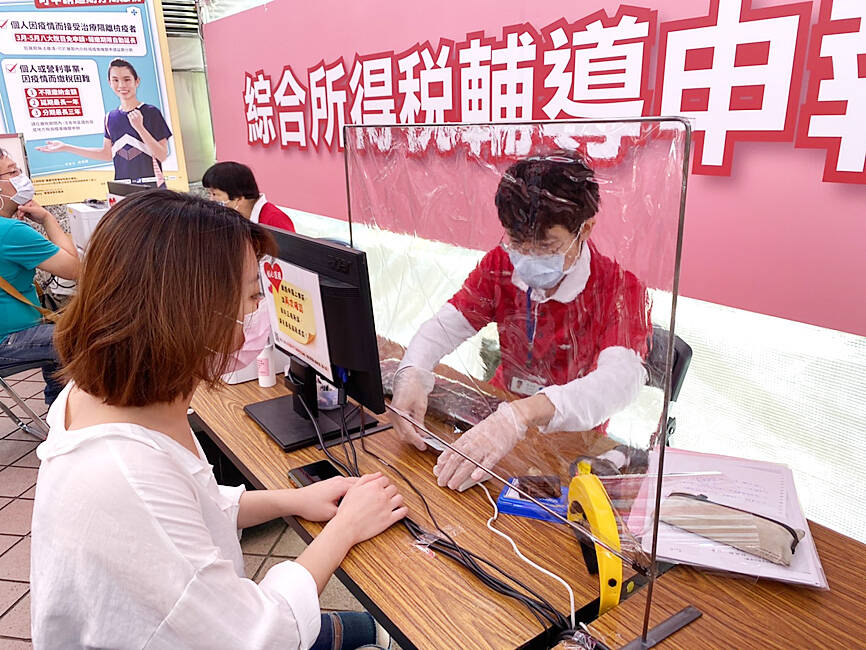The government last month collected NT$95.6 billion (US$3.1 billion) in tax revenue, up 24.6 percent from February last year, thanks to more working days that boosted personal income, securities transactions and vehicle sales taxes, the Ministry of Finance said yesterday.
However, the state coffers reported a 2.7 percent annual decline in tax revenue for the first two months of this year, as corporate income, the local bourse and the property market lost steam amid economic challenges, the ministry said.
Corporate income tax revenue dropped 13.8 percent year-on-year to NT$4.6 billion last month and declined 15.9 percent to NT$8.5 billion in the first two months, as exporters took a hit from a global economic slowdown, ministry statistics official Liang Kuan-shuan (梁冠璇) told an online media briefing.

Photo: Allen Wu, Taipei Times
Personal income tax revenue rose 10.7 percent year-on-year to NT$41.3 billion last month and 5.9 percent annually for the first two months to NT$80.4 billion, Liang said, attributing the trend to higher stock dividends.
Tech and non-tech firms reported robust business in the first half of last year before taking a hit amid global central banks’ interest increases to fight inflation, affecting demand for nonessential goods.
Securities tax revenue rose 11 percent year-on-year to NT$12.2 billion last month, which had three working days more than February last year, Liang said, adding that tax revenue in the first two months plunged 32.9 percent to NT$19.1 billion, weighed by lingering bleak sentiment.
The US Federal Reserve last month slowed the pace of rate increases, raising it by 0.25 percentage points, but this week indicated that more aggressive steps might be taken in the coming months, citing stronger-than-expected economic data.
The New Taiwan dollar has weakened against the US dollar, reversing an earlier rebound, as global funds again pulled out of Taiwan in search of higher yields in US dollar denominated assets, central bank data showed.
The tax revenue generated from land value gains last month fell 22 percent from a year earlier to NT$5.7 billion and plummeted 40 percent annually to NT$10.8 billion in the first two months, Liang said, citing as reasons interest rate hikes in Taiwan and new rules banning the resale of presale house purchase agreements.
The number of taxable cases in the local real-estate market in the first two months shrank 25.9 percent year-on-year to 79,182, as buyers stayed on the sidelines, Liang said.
Sales tax revenue bucked the downtrend with a 40.5 percent surge to NT$15.1 billion last month and increased 2.1 percent to NT$23.7 billion in the first two months, the ministry said.
The holiday effect and a noticeable advance in imported vehicles drove the strong showing, Liang said.
The cumulative tax revenue of NT$272.4 billion in the first two months was 5.2 higher than the government’s target, she said.

When an apartment comes up for rent in Germany’s big cities, hundreds of prospective tenants often queue down the street to view it, but the acute shortage of affordable housing is getting scant attention ahead of today’s snap general election. “Housing is one of the main problems for people, but nobody talks about it, nobody takes it seriously,” said Andreas Ibel, president of Build Europe, an association representing housing developers. Migration and the sluggish economy top the list of voters’ concerns, but analysts say housing policy fails to break through as returns on investment take time to register, making the

EARLY TALKS: Measures under consideration include convincing allies to match US curbs, further restricting exports of AI chips or GPUs, and blocking Chinese investments US President Donald Trump’s administration is sketching out tougher versions of US semiconductor curbs and pressuring key allies to escalate their restrictions on China’s chip industry, an early indication the new US president plans to expand efforts that began under former US president Joe Biden to limit Beijing’s technological prowess. Trump officials recently met with their Japanese and Dutch counterparts about restricting Tokyo Electron Ltd and ASML Holding NV engineers from maintaining semiconductor gear in China, people familiar with the matter said. The aim, which was also a priority for Biden, is to see key allies match China curbs the US

NOT TO WORRY: Some people are concerned funds might continue moving out of the country, but the central bank said financial account outflows are not unusual in Taiwan Taiwan’s outbound investments hit a new high last year due to investments made by contract chipmaker Taiwan Semiconductor Manufacturing Co (TSMC, 台積電) and other major manufacturers to boost global expansion, the central bank said on Thursday. The net increase in outbound investments last year reached a record US$21.05 billion, while the net increase in outbound investments by Taiwanese residents reached a record US$31.98 billion, central bank data showed. Chen Fei-wen (陳斐紋), deputy director of the central bank’s Department of Economic Research, said the increase was largely due to TSMC’s efforts to expand production in the US and Japan. Investments by Vanguard International

‘SACRED MOUNTAIN’: The chipmaker can form joint ventures abroad, except in China, but like other firms, it needs government approval for large investments Taiwan Semiconductor Manufacturing Co (TSMC, 台積電) needs government permission for any overseas joint ventures (JVs), but there are no restrictions on making the most advanced chips overseas other than for China, Minister of Economic Affairs J.W. Kuo (郭智輝) said yesterday. US media have said that TSMC, the world’s largest contract chipmaker and a major supplier to companies such as Apple Inc and Nvidia Corp, has been in talks for a stake in Intel Corp. Neither company has confirmed the talks, but US President Donald Trump has accused Taiwan of taking away the US’ semiconductor business and said he wants the industry back